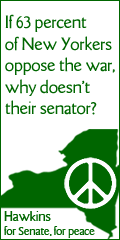|
Back
|
Declare Your Political Independence
Declare Your Political Independence |
When Americans declared their independence from the rule of the King of England, they did not intend to replace one unelected ruler with another.
Yet today we need to declare our independence from the unelected corporate elites who now so thoroughly own the major parties in America that is matters little to them who wins. As Boss Tweed of Tammany Hall infamously remarked, "You may elect whichever candidate you please to office, if you allow me to select the candidates."
Public opinion polls shows that the progressive policies of the Green Party are far more reflective of the positions held by voters on such issues as health care, the war, the economy, housing and the environment than the pro-corporate policies of the Democrats and Republicans.
Despite repeated betrayals, however, many progressives remain loyal Democratic voters. For instance, anti-war Democrats voted for pro-war Kerry in 2004. Expecting the Democrats to end the Iraq war is like expecting the crack addicts to turn in their dealers.
That is because the Democrats are addicted to campaign cash from the corporate interests that want the US military to be a global occupation force protecting their investments and access to natural resources and cheap labor abroad.
The Democrats are also addicted to the military contracts the Pentagon has strategically placed in every state and congressional district. They are afraid to oppose military spending because it might mean jobs lost among their constituents.
Corporate campaign cash and military contracts constitute a political economy of militarism that binds the Democrats and Republicans together around the so-called "bipartisan consensus" on foreign policy, a policy that is not about defending the US homeland but about a global empire of military bases protecting corporate interests.
Similar political economics are at work in binding the Democrats and Republicans together around pro-corporate economic policies that favor big business at the expense of working people. Take health care.
When Hillary Clinton was put in charge of health care reform in 1993 in the early days of the Clinton administration, national health insurance had been in the Democratic platform since President Truman. This issue had catapulted two tremendous underdogs, Paul Wellstone of Minnesota and Harrison Wofford of Pennsylvania, into the US Senate in 1992. It had 100 co-sponsors in Congress and 70 percent support in public opinion polls.
Yet Clinton summarily refused to consider national health insurance and instead opted for a compulsory private health insurance system to provide near universal coverage. The private health insurance system in the US is the most inefficient and irrational in the world. With around 30 percent overhead costs due to bureaucracy, excessive management salaries, and profits, the US spends twice as much on health care per person as any other country while leaving 46 million people uninsured and achieving health outcomes ranked 37th according to the World Health Organization.
The overhead costs for Medicare are only 3 percent. With a Medicare for All system, we could provide coverage for every American and still save $286 billion a year in health care expenses, according to Physicians for a National Health Plan. People would have more freedom to choose their doctors and hospitals. It is a simple and efficient solution that every other industrial nation in the world has figured out.
Why did the Democrats, when they had control of the Presidency and both houses of Congress under Johnson, Carter, and Clinton, fail to implement national health insurance? The answer is that the Democrats did not want to alienate the insurance companies that have long been one of their principal sources of campaign funds.
The two-party system is how the corporate elites rule. It gives us the illusion of choice. To be sure, the Democrats and Republicans have some differences on the so-called "wedge issues" of gays, guns, and abortion. Important as these issues are, the bipartisan consensus on foreign and economic policy of most concern to the corporate elites is not contested.
Since it is widely believed that progressives, environmentalists, labor, and peace activists will always vote Democratic no matter what, the Democrats feel free to take their votes for granted without delivering on policies. This was particularly evident in the 2004 elections. When tens of millions demonstrated in the US and worldwide against the pending invasion of Iraq, the peace movement was described by the New York Times as the second world superpower. Yet the peace movement gave away its independence and hence its power by supporting the pro-war Democratic presidential ticket as the "lesser evil." To this day, Democrats like Hillary Clinton remain pro-war because they can take the peace movement's votes for granted.
The polls now show Republican support declining in the wake of the Iraq quagmire and revelations of corruption and abuses of privacy and civil liberties. Yet the Republican decline is not seeing a commensurate rise in Democratic support. Indeed, a recent poll by Princeton Survey Research Associates, found that 72 percent want to see a third party candidate in the 2008 presidential election.
Why wait until 2008 to declare your political independence from the two-party system of corporate rule? The majority of New Yorkers support withdrawal from Iraq and national health insurance. Hillary Clinton does not. But I do. If the majority of New Yorkers vote for what they want, I will be the next Senator from New York. |
| |
 *Website by David Doonan, Labor Donated to Hawkins for Senate Campaign* *Website by David Doonan, Labor Donated to Hawkins for Senate Campaign* |
|
|


